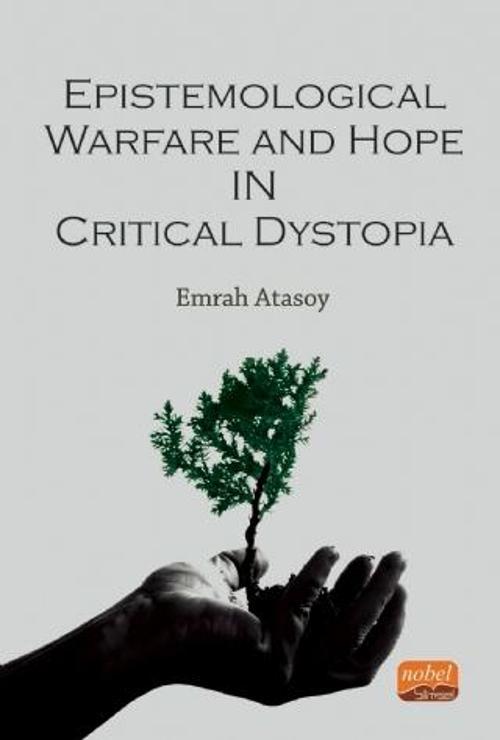Sepette İndirim
289,75 TL305,00 TL
Benzer Ürünler
“In this book, Emrah Atasoy traces the protagonists of three important but neglected twentieth century dystopias, as they move from innocence (ignorance) regarding the worlds in which they live to an awareness (knowledge) of how they are oppressed. In doing so he reveals the utopian potential of dystopian narratives, demonstrating that while knowledge and understanding are not enough to overcome oppression, they are necessary for hope.”
Lyman Tower Sargent, Professor Emeritus of Political Science, University of Missouri-St. Louis, USA.
“Emrah Atasoy’s study combines a thorough overview of the development of the dystopian genre with an original and impressive close reading of three significant novels. By examining the journey motif and certain binary oppositions that are characteristic of the genre and of its totalitarian societies, Atasoy demonstrates the protagonists’ understanding of the manipulative nature of the system. Such epistemological warfare allows them to move from institutionalized ignorance to ‘experience and the possibility of utopian hope.’”
Raffaella Baccolini, Professor of English Literature and Gender Studies, University of Bologna, Italy.
“Emrah Atasoy’s book makes an important contribution to the field of literary dystopian studies. Drawing on an impressive body of knowledge and research, this work offers a valuable overview of the subject. The chapter on Anthony Burgess is an exemplary piece of work, with a detailed discussion of the theology which underpins The Wanting Seed. Everyone who takes a serious interest in dystopian literature will want to read this book.”
Andrew Biswell, Professor of Modern Literature, Manchester Metropolitan University, UK.
This book focuses on the transition from innocence and ignorance to experience and knowledge in dystopian fiction, revealing that truth and knowledge in Katharine Burdekin's Swastika Night, Anthony Burgess's The Wanting Seed, and P. D. James's The Children of Men are fictional constructs. These critical dystopias show characters' journeys from ignorance to experience as a process of epistemological warfare. The protagonists' initial ignorance is shattered through various symbolic transformations, increasing the utopian undertone within these examples of critical dystopia. The open-ended structure of these texts reinforces the hope of the utopian impulses and of revisionary epistemologies that might lead to more just, meritocratic societies.
Lyman Tower Sargent, Professor Emeritus of Political Science, University of Missouri-St. Louis, USA.
“Emrah Atasoy’s study combines a thorough overview of the development of the dystopian genre with an original and impressive close reading of three significant novels. By examining the journey motif and certain binary oppositions that are characteristic of the genre and of its totalitarian societies, Atasoy demonstrates the protagonists’ understanding of the manipulative nature of the system. Such epistemological warfare allows them to move from institutionalized ignorance to ‘experience and the possibility of utopian hope.’”
Raffaella Baccolini, Professor of English Literature and Gender Studies, University of Bologna, Italy.
“Emrah Atasoy’s book makes an important contribution to the field of literary dystopian studies. Drawing on an impressive body of knowledge and research, this work offers a valuable overview of the subject. The chapter on Anthony Burgess is an exemplary piece of work, with a detailed discussion of the theology which underpins The Wanting Seed. Everyone who takes a serious interest in dystopian literature will want to read this book.”
Andrew Biswell, Professor of Modern Literature, Manchester Metropolitan University, UK.
This book focuses on the transition from innocence and ignorance to experience and knowledge in dystopian fiction, revealing that truth and knowledge in Katharine Burdekin's Swastika Night, Anthony Burgess's The Wanting Seed, and P. D. James's The Children of Men are fictional constructs. These critical dystopias show characters' journeys from ignorance to experience as a process of epistemological warfare. The protagonists' initial ignorance is shattered through various symbolic transformations, increasing the utopian undertone within these examples of critical dystopia. The open-ended structure of these texts reinforces the hope of the utopian impulses and of revisionary epistemologies that might lead to more just, meritocratic societies.
Neden idefix?
Siparişinizi teslim aldığınız tarihten itibaren 14 gün içinde iade edebilir, iade sürecinin tamamlanmasının ardındansa ödemenizi hızla geri alabilirsiniz.
Kullanıcı dostu ara yüzümüz tüm ihtiyaçlarınıza eksiksiz yanıt verebilmek için tasarlandı. Deneyiminizi uçtan uca kusursuz kılmak adına çağrı merkezimiz ve canlı destek hattımızla ihtiyaç duyduğunuz her anda yanınızdayız!
Siparişlerinizin bir an önce ulaşması için sabırsızlandığınızın farkındayız. Sunduğumuz farklı teslimat seçenekleri arasından size en uygununu belirlemeniz, siparişinizi olabildiğince çabuk veya dilediğiniz zaman aralığında sorunsuz bir biçimde teslim etmemiz için yeterli.
305,00 TLSepette İndirim
289,75 TL
